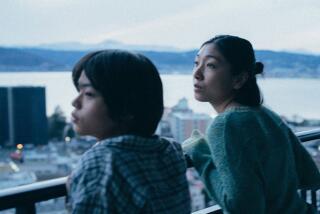Cannes: Hirokazu Kore-eda deftly explores family in ‘Our Little Sister’
- Share via
CANNES, France — The press-day publicity apparatus that surrounds directors of competition films at the Festival de Cannes is never less than surreal, but it feels especially out of place when the filmmaker in question is Japan’s Hirokazu Kore-eda.
What could the ceaseless, mad hubbub of journalists, photographers, publicists, producers, festival factotums and assorted hangers-on, all converging on one uncommonly busy room, have to do with a director whose films are delicate, unforced, exquisitely human meditations on what it means to be alive?
Kore-eda’s latest film, “Our Little Sister,” premiered here to a warm reception and was just acquired by Sony Pictures Classics. About to turn 53, the writer-director has been a secret pleasure of discerning filmgoers for decades, starting when his 1995 feature debut, “Maborosi,” won a prize at Venice.
Kore-eda really broke through with 1998’s singular “After Life,” and the features since have included exceptional works “Nobody Knows” (2004), “Still Walking” (2008) and “Like Father, Like Son” (2013), which won the Jury Prize here and is scheduled to be remade by Steven Spielberg.
It’s not surprising, given the nature of his films, that Kore-eda in person is a calm, focused man whose face lights up when a question intrigues him. So beautifully dressed in soft blue sports jacket, white shirt and dark green pants that it’s tempting to ask about the labels, Kore-eda is invariably thoughtful and empathetic. He might have chosen a quieter career if Ingrid Bergman hadn’t gotten in the way.
“When I was a child, I loved making stories, so I thought maybe I would be a novelist,” the director says through a translator. “But my mother adored Ingrid Bergman, I went to a lot of her movies, including ‘Casablanca,’ with my mother, and gradually the idea formed to make films.”
“Our Little Sister” was adapted from Akimi Yoshida’s successful graphic novel “Umimachi Diary.” It takes place over a year in the seaside city of Kamakura, Japan, and deals, as Kore-eda’s films often do, with family.
The plot of “Our Little Sister” kicks in when three sisters in their 20s who live together in their old family house receive the news that their father, whom they haven’t seen in 15 years, has died.
Traveling to the funeral in a small town, they meet Suzu (Suzu Hirose, described in the press notes as “The Busiest 16-Year-Old in Japan”), the shy half sister they didn’t know they had. She’s the daughter of their father and the woman who broke up his marriage to the three sisters’ mother.
On an impulse, Sachi (Haruka Ayase), a nurse and the take-charge oldest daughter, invites Suzu to move to Kamakura and live with them. As the seasons and emotions change, we watch, transfixed, as a new family forms and life in all its inescapable complexities happens to these characters and those they know and love.
Beautifully shot with an attention to the natural world by “Like Father, Like Son” cinematographer Mikiya Takimoto, “Our Little Sister” features artfully written and crafted vignettes, but ask Kore-eda about his favorite moment and he will pick something else entirely.
It’s a scene in which young Suzu and a friend ride their bicycles through a veritable tunnel of blooming cherry blossoms.
“A single blossom fell on her hair in a perfect spot — it just happened,” the director says, awestruck about this “perfect shot” he had nothing to do with.
Kore-eda acknowledges that in this and many of his other films, dealing with families is a big draw for him.
“Yes, a family is interesting,” he says. “You can get a lot of drama in the conflicts there. It’s like the sea. It seems calm, but inside there is conflict.”
In this focus on character drama, Kore-eda is reminiscent of the great Japanese auteur Yasujiro Ozu, one of whose films (“An Autumn Afternoon” from 1962) Kore-eda introduced at a Cannes Classics screening in 2013 with the information that he tries to write his own scripts in the same mountain retreat Ozu used.
“Of course I admire him,” Kore-eda says, while pointing out that “our methods are quite different. He worked for a big studio, and I have to raise money independently.” He’s also not sure how to respond to critics who’ve said, “You’re like a grandson to Ozu.”
“It’s a nice compliment,” Kore-eda says, “but I’m not sure I take it seriously.”
There is one place where Kore-eda’s focus on his own kind of cinema does create a kinship with his predecessor.
“Ozu said, ‘I’m a tofu maker, and I keep on making tofu,’ and that is what I do as well.”
Kore-eda’s quiet character dramas are worlds apart from explosion-heavy superhero films that are all the rage, but the director understandably contends that his films are not only more interesting but also more challenging, because it’s “more difficult to explore feelings.”
His kinds of films, however, also demand a lot of moviegoers.
“They have to be carefully watched, audiences need to concentrate, to listen quite carefully,” the director says. “Things are done in a very subtle way, without explaining. That’s quite challenging.”
A key statement in “Our Little Sister” comes by way of the sisters’ grandmother, who turns out to have believed that “every living thing takes time and effort,” a sentiment the director stands behind as well.
“For the sisters to form a real family, you need a lot of time,” Kore-eda says. “That expresses the essence of this film.”
More to Read
Only good movies
Get the Indie Focus newsletter, Mark Olsen's weekly guide to the world of cinema.
You may occasionally receive promotional content from the Los Angeles Times.











